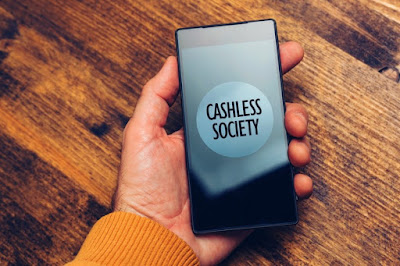history of cashless society
A cashless culture explains a financial specify where monetary deals are not carried out with cash through physical banknotes or coins, however instead with the move of electronic info (typically a digital depiction of cash) in between the transacting celebrations.[1] Cashless cultures have existed from the moment when human culture entered presence, based upon trade and various other techniques of trade, and cashless deals have likewise ended up being feasible in contemporary times utilizing electronic moneys such as bitcoin. Nevertheless this short post talks about and concentrates on the call "cashless culture" in the feeling of a relocation to, and ramifications of, a culture where money is changed by its electronic equivalent—in various other words, lawful tender (cash) exists, is tape-taped, and is traded just in digital electronic develop.
Such an idea has been talked about commonly, especially since the globe is experiencing a fast and enhancing use electronic techniques of tape-taping, handling, and trading cash in business, financial investment and everyday life in numerous components of the globe, and deals which would certainly traditionally have been carried out with money are frequently currently carried out digitally.[2][3] Some nations currently establish limitations on deals and deal worths for which non-electronic resettlement might be lawfully utilized.[4] KEMAHIRAN MEMASANG JUDI BOLA ONLINE TERPERCAYA
The pattern to use non-cash deals and negotiation in everyday life started throughout the 1990s, when digital financial ended up being typical. By the 2010s electronic resettlement techniques were extensive in numerous nations,[which?] with instances consisting of middlemans such as PayPal, electronic purse systems such as Apple Pay, contactless and NFC resettlements by digital card or mobile phone, and digital expenses and financial, done in extensive utilize.[3] At this moment money had ended up being proactively disfavored in some type of deal which would certainly traditionally have been really regular to pay with physical tender, and bigger money quantities remained in some circumstances dealt with with suspicion, because of its flexibility and relieve of utilize in cash laundering and funding of terrorism. Furthermore, resettlement with a big quantity of money has been proactively restricted by some providers and sellers,[5] to the factor of coining the expression of a "battle on money".[6] The 2016 Unified Specifies Individual Customer Study Examine declares that 75% of participants favored a credit rating or debit card as their resettlement technique while just 11% of participants favored money.[7] Because the founding of both business in 2009, electronic resettlements could currently be made by techniques such as Venmo and Settle. Venmo enables people to earn straight resettlements to various other people without having actually money available. Settle is a development that enables mainly small companies to get resettlements from their customers.
By 2016, just regarding 2% of the worth transacted in Sweden was by money, and just regarding 20% of retail deals remained in money. Less compared to fifty percent of financial institution branches in the nation carried out money deals.[2] The removal far from money is associated to financial institutions persuading companies to utilize straight down payment in the 1960s, financial institutions billing for inspects beginning in the 1990s, financial institutions introducing the practical Swish smartphone-to-phone resettlement system in 2012, and the introduce of iZettle for little vendors to approve charge card in 2011.[2]


